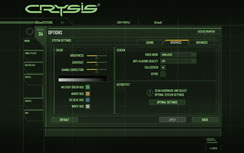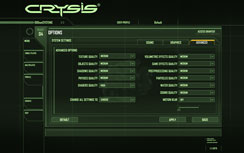Crysis
Publisher: Electronic ArtsWhat can we say about this game that hasn't been said already? Crysis was probably the most anticipated game on the PC last year and was released on November 16th 2007.
Crysis is seen by many as the poster boy for DirectX 10 and it will make your system cry, quite literally – it's a monster! It doesn't come as much of a surprise then, that the graphics are something special – they're above and beyond anything we've ever seen before in a PC game.
We tested the game under both DirectX 9.0 and DirectX 10 with the 1.21 patch applied. We used a custom timedemo recorded on the Harbor map which is more representative of gameplay than the built-in benchmark that renders things much faster than you're going to experience in game. We found that around 30-33 fps in our timedemo was sufficient enough to obtain a playable frame rate through the game. It's a little different to other games in that the low frame rates still appear to be quite smooth.
For our testing, we set the majority of the in-game settings to medium, with shaders and sound set to high. Because of how intensive the game is, we tested with both anti-aliasing and anisotropic filtering disabled on these mid-range cards – but of course, you can enable AA if you want to sacrifice some other in-game details in order to get a playable frame rate. There is currently no support for anisotropic filtering in the game, but you can still force it from the driver control panel.
BFG's hefty overclocks to the two cards have an obvious effect, and the 11 percent overclock for the 8800GT OCX gives it a clear performance increase over the reference card, especially at the higher 1,680 x 1,050 resolution, where performance is improved by over 10 percent. The 9600 GT OCX, on the other hand, appears to fair a little worse, but this is due to us testing it against a single slot pre-overclocked card, and not a standard-clocked GeForce 9600 GT.
For pre-overclocked cards, both the 8800 GT OCX and 9600 GT OCX perform very well indeed, and the addition of the extra cooling has a clear improvement thanks to the obvious performance advantage the 9600 GT OCX holds over its overclocked and single slot cooled 9600 GT relative.

MSI MPG Velox 100R Chassis Review
October 14 2021 | 15:04











Want to comment? Please log in.